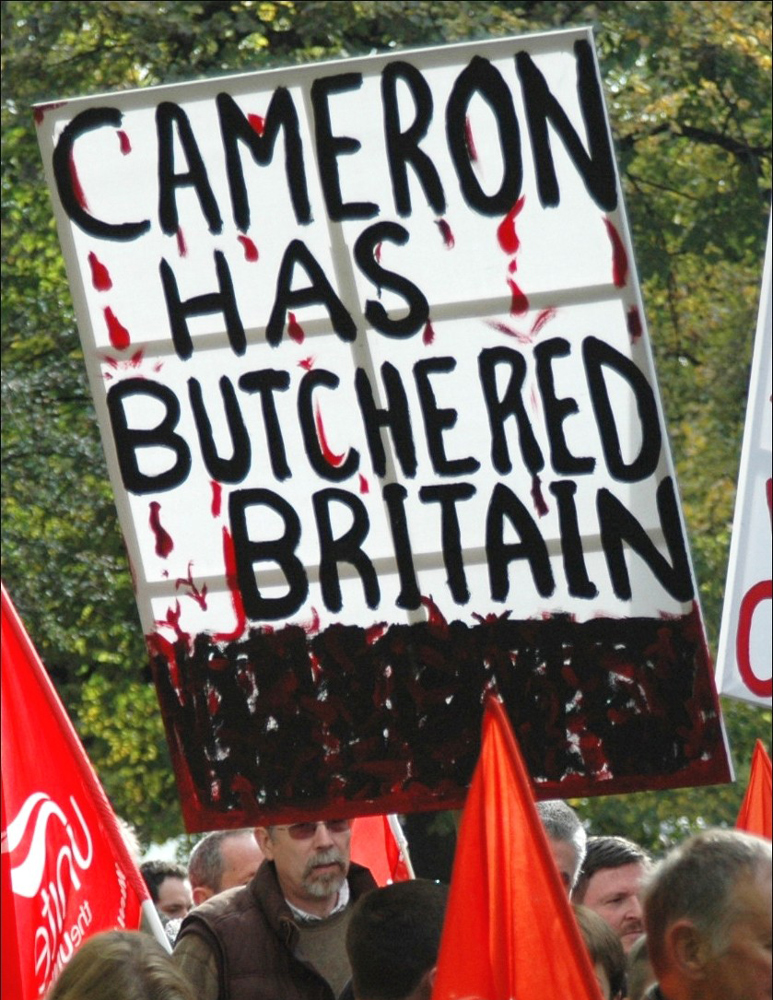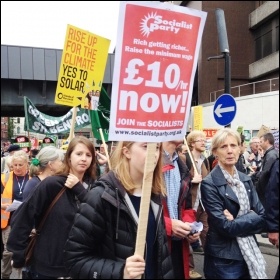Fightback essential following Osborne’s hatchet budget
For the millionaire Tory cabinet ministers sitting in their ivory towers the plight of working class people is off their radar and concern. What do they care if a whole generation of young people is condemned to a desperate struggle for the basic necessities of life?
Since the Tories’ unexpected election break in May – scraping back into power with the votes of 24% of the electorate – hatchet chancellor George Osborne has been licking his lips in anticipation of the further destruction he can inflict on the welfare state.
In today’s budget he triumphantly announced measures that will worsen the struggle to get by of many working class and middle class people, by slashing tax credits and housing benefit, and maintaining public sector wage increases at just 1%. He did this while repeating his brazen lie that “we are all in this together”. Especially worse off after Osborne’s budget will be future parents who have more than two children; as a result of his vindictive cuts, many children in larger families will be condemned to greater poverty than those in smaller families.
The justification he resorted to for cutting in-work benefits – to disguise an ideological war on welfare – was that they are effectively subsidising employers. But apart from his introduction of a new “national living wage” of £7-20 an hour from next April, which is in reality far less than a real ‘living’ wage, he leaves low paid workers (who are having their benefits reduced) at the mercy of the goodwill of their bosses, and we all know the likely result of that.
For Osborne, it’s not enough that the top companies already amass vast profits while paying poverty wages. He has given the Tories’ big business friends an enormous tax handout with corporation tax to be reduced to 19% in 2017 and 18% in 2020.
Raising the annual income threshold at which tax starts to £11,000 will be generally welcomed, but this isn’t a measure that gives more to the lowest paid workers; it puts the same tax-free earnings sum into the pockets of all earners, including the richest. That measure, and the increase in the re-named minimum wage (which will be an additional 50p an hour after the increase of 20p due in October) puts some much-needed extra money into workers’ pockets. However, on the other hand, most or all of it will be taken away for many by the slashing of in-work benefits, not to mention the effect of public sector wages being held at low levels.
Housing crisis
The massive and acute lack of affordable housing will grow even greater with the Tory budget’s inclusion of a sell-off of Housing Association stock via the forewarned “right to buy” announcement. Much of this housing stock will end up in the hands of buy-to-let landlords charging astronomical ‘market’ rents.
Local authorities have had an indirect funding cut by being forced to reduce council property rents by 1% a year for four years, along with housing associations, a very small welcome measure for a layer of tenants, but one designed to cut the government’s housing benefit bill rather than being of significant benefit to tenants.
“The best way to help working people is to let them keep more of the money they earn” argued Osborne just minutes after he had announced a major blow to social housing tenants who earn more than £30,000 a year (or £40,000 in London). They will be penalised with ‘market’ level rents or will have to uproot themselves and move elsewhere. Yet the Rowntree foundation has calculated that a couple with two children need an income of £40,000 if they are to have an acceptable standard of living.
Youth and students
For young people, there is no respite. Students from low waged households have had their small lifeline of a means-tested grant removed, turned into more loans to weigh them down with ever more frightening levels of debt. Young people shouldn’t go straight from school to the dole decreed Osborne, so he abolished housing benefit for 18 to 21 year olds, ensuring that instead they can go from school to sleeping on the street. For some though, there will be more slave labour ‘apprenticeships’. And no one under 25 will be entitled to the national living wage.
Overall, this budget cuts nearly £13 billion a year from welfare, which will add to the existing terrible levels of deprivation and hardship. Pressure on claimants and job-seekers, already causing suicides when faced with benefits sanctions, will remain and in some cases be stepped up – parents of children over the age of three are now on the list of those to be hit.
Osborne and Cameron’s measures will certainly not reduce the massive and escalating inequality in society, which of course is the expected outcome from this pro-big business capitalist government that looks after the interests of the rich and powerful. Neither will it alter the precariousness of the economy recovery, which is inherently weak and highly exposed to impending shocks from the eurozone and world economy.
The urgency of the measures agreed at the conference of the National Shop Stewards Conference on 4th July are ever more clear: Calling for the TUC to organise a national campaign of public meetings and rallies to build for coordinated strike action against austerity, including to prepare for a 24 hour general strike.
The Greek workers are saying no to austerity; so must we!
Judy Beishon
For a £10 an hour minimum wage now!
Chancellor George Osborne boasted in his budget speech of creating a “living wage” of £9 an hour by 2020. Although this is higher than the £8 an hour minimum wage by 2020 pledged by Labour in the general election, it will definitely not be a ‘living wage’.
The current UK ‘living wage’ levels according to the Living Wage Foundation are £7.85 an hour and £9.15 an hour in London. The Socialist Party, along with most trade unions, campaigns for the immediate implementation of a £10 an hour minimum wage as a step toward a real living wage.
Dave Carr
Tax credits slashed
Osborne has tried to claim that the Tories are looking after working people. But the small promised increase in the minimum wage will not come close to compensating for the savaging of in-work benefits.
It is estimated that 45% of ‘hardworking families’ will be worse off as a result of the cuts to Working Tax Credit.
Previously, to qualify for maximum Working Tax Credit you had to earn less than £6,420 a year; now it is nearly half that at £3,850. The rate at which the benefit tapers off once you earn over that has also been increased. Seumas Milne, writing in the Guardian, says a family with one earner on average earnings will lose over £2,000 a year in tax credits. A family with one earner on the minimum wage would lose considerably more.
The promised 70p increase in the minimum wage (20p in October and 50p next April) would provide £1,092 extra a year for someone working a 30 hour week; nowhere near enough to compensate for the slashing of Working Tax Credits.
Hannah Sell
The losers:
- 13 million families will lose an average of £260 a year due to a freeze in working age benefits, tax credits and local housing allowance up to 2020
- Three million families will lose an average of £1,000 a year due to cuts in Universal Credit.
- The working tax credit threshold to receive the maximum has been reduced from £6,420 a year to just £3,850
- Tax credits and family benefits under Universal Credit will be limited to the first two children only
- Benefit cap reduced to £20,000 (£23,000 in London)
- Employment and Support Allowance to severely disabled people and the long term sick cut by £30 a week
- Under-25s denied the “national living wage”
- Public sector wages (effectively frozen between 2010 and 2015) will be further pegged to a 1% annual rise, ie below price inflation
- Students from low-waged households will have means-tested grants removed and turned into more debt-laden loans
- Housing benefit abolished for 18 to 21 year-olds
- More slave labour ‘apprenticeships’
…and the winners:
- Big business will enjoy yet another cut in corporation tax – down to 18% by 2020
- National insurance bill for companies will also be cut
- Raising the annual income threshold at which income tax starts to £11,000 will benefit higher earners the most
- Defence spending will rise to 2% of GDP (total output), £47.7 billion, by 2020 – benefiting private armaments companies











